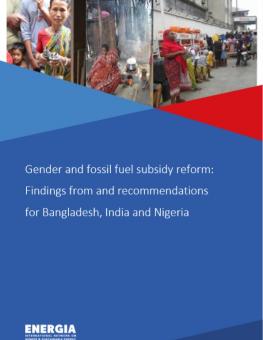
Gender and Fossil Fuel Subsidy Reform: Findings from and recommendations for Bangladesh, India and Nigeria
This report looks at the impact of subsidies to kerosene and liquefied petroleum gas (LPG) and subsidy reform from a gender perspective across three countries: Bangladesh, India and Nigeria.
This report looks at the impact of subsidies to kerosene and liquefied petroleum gas (LPG) and subsidy reform from a gender perspective across three countries: Bangladesh, India and Nigeria.
The research is based around two overall research questions:
- How do existing kerosene and LPG subsidy policies affect the welfare, productivity and empowerment of women and girls in low-income households?
- How might the welfare, productivity and empowerment of women and girls in low-income households change as a result of specific, nationally relevant proposals for the reform of existing kerosene and LPG subsidies?
These questions were explored using secondary data, household surveys across the three countries reaching over 2,400 households and focus group discussions. The questions were answered within the context of hypotheses made during the scoping phase and literature review for the research, based on a review of 28 reform episodes. This research attempted to answer the above questions in relation to an income effect, an energy use effect and an energy supply effect, all from a gender perspective
You might also be interested in
COP 29 Outcome Moves Needle on Finance
In the last hours of negotiations, concerted pressure from the most vulnerable developing countries resulted in an improved outcome on the finance target, with a decision to set a goal of at least USD 300 billion per year by 2035 for developing countries to advance their climate action.
The United Kingdom, New Zealand, and Colombia Join Coalition to Phase Out Fossil Fuel Subsidies
Today on the sidelines of the UN Climate Conference in Baku (COP 29), the United Kingdom, New Zealand, and Colombia joined the international Coalition on Phasing Out Fossil Fuel Incentives Including Subsidies (COFFIS).
COP 29 Must Deliver on Last Year’s Historic Energy Transition Pact
At COP 29 in Baku, countries must build on what was achieved at COP 28 and clarify what tripling renewables and transitioning away from fossil fuels means in practice.
How Indonesia's Incoming President Can Advance the Transition to Clean Energy
With Prabowo Subianto inaugurated as Indonesia’s President, speculation abounds about the new administration’s commitment to the clean energy transition and climate targets, given Prabowo’s positioning as the “continuity candidate.” The question is, what, exactly, will be continued?